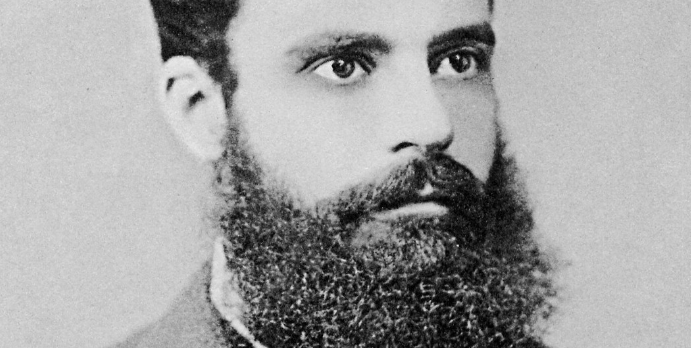One prominent person rarely associated by scholars with the Bastiat-Ferrara laissez-faire school was the eminent sociologist and economic theorist, Vilfredo Federico Damaso Pareto (1848-1923). Pareto was born in Paris into a noble Genoan family. His father, the Marchese Raffaelle Pareto, a hydraulic engineer, had fled Italy as a republican and supporter of Mazzini. The senior Pareto returned to Italy in the mid-1850s and gained a high rank in the Italian civil service. The young Pareto studied at the Turin Polytechnic where he earned a graduate engineering degree in 1869; his graduate thesis was on the fundamental principle of equilibrium in solid bodies. As we shall see in a later volume, Pareto’s thesis led him to the idea that equilibrium in mechanics is the proper paradigm for investigation into economics and the social sciences.1 After graduation, Pareto became a director of the Florence branch of the Rome Railway Company, and in a few years he became managing director of a Florence firm manufacturing iron and iron products.
Pareto soon plunged into political writing, taking a fiery stand in favour of laissez-faire and against all forms of government intervention, defending personal and economic freedom, and attacking plutocratic subsidies and privileges to business with equal fervour to his denunciations of social legislation or proletarian socialist forms of intervention. Pareto was one of the founders of the Adam Smith Society in Italy, and also ran unsuccessfully for Parliament twice during the early 1880s.
Heavily influenced by Molinari, Pareto’s writings came to the latter’s attention in 1887. Molinari then invited Pareto to submit articles to the Journal des Economistes. Pareto met the French liberals, and formed a friend ship with Yves Guyot, who was to be Molinari’s successor as editor of the Journal and who was to write Molinari’s obituary in 1912. Shortly after getting in touch with Molinari, Pareto’s mother died, and he was able to give up his manufacturing post, become a consulting engineer, get married, and retire to his villa in 1890 to devote the rest of his life to writing, scholarship, and the social sciences. Freed of his business duties, Pareto plunged into a one-man crusade against the state and statism, and formed a close friendship with the laissez-faire neoclassical marginalist economist Maffeo Pantaleoni (1857-1924), who drew Pareto into technical economic theory. Having be come a Walrasian under Pantaleoni’s tutelage, Pareto succeeded Leon Walras as professor of political economy at the University of Lausanne. Pareto continued at Lausanne, also teaching sociology, until 1907, when he fell ill, and retired to a villa on Lake Geneva, where he continued to study and write until his death.
Pareto’s shift into technical neoclassical theory did not for a moment abate his ardent battle for freedom and against all forms of statism, including militarism. An idea of his trenchant laissez-faire liberalism can be gained from his article on ‘Socialism and Freedom’ published in 1891:
So we can group socialists and protectionists under the name of restrictionists, whilst those who want to base the distribution of wealth solely on free competition can be called liberationists… Thus restrictionists are divided into two types: socialists, who through the intervention of the state, wish to change the distribution of wealth in favour of the less rich; and the others, who, even if they are sometimes not completely conscious of what they are doing, favour the rich- these are the supporters of commercial protectionism and social organisation of a military type. We owe to Spencer the demonstration of the close analogy of these two types of protectionism. This similarity between protectionism and socialism was very well under stood by the English liberals of the school of Cobden and that of John Bright and was clarified in the writings of Bastiat.2
Pareto’s writings, furthermore, are studded with appreciative and often lengthy quotes from Molinari. Thus, in the same article on ‘Socialism and Freedom’, Pareto praises Molinari for advancing a unique and bold system that ‘proceed(s) towards the conquest of freedom, using all the knowledge that is offered by modern science’.
In his ‘Introduction to Marx’s Capital’ in a book on Marxism (Marxisme et economie pure, 1893), Pareto was clearly influenced by the French libertarian Dunoyer-Comte concept of the ‘ruling class’ as whatever group controls the state. He ended the chapter with a lengthy and admiring quote from Molinari, who carried through this libertarian class doctrine. Pareto ended the Molinari quote with this sentence: ‘Everywhere the ruling classes have one thought—their own selfish interests—and they use the government to satisfy them.’3
Pareto’s first great treatise on economics, the Cours d’Economie Politique (1896), was heavily influenced by both Molinari and Herbert Spencer. In every polity, he points out, there is a minority ruling class exploiting the majority who are the ruled. Tariffs Pareto treats as an example of legal spoliation, plunder and theft. Pareto left no doubt that his objective was to eradicate all such legalized plunder. As Placido Bucolo points out, Pareto did not, as some analysts claim, adopt a Marxian view of class struggle in his Cours. Instead, he adopted the French libertarian class doctrine. Thus, Pareto says in the Cours:
the class struggle assumes two forms at all times. One consists in economic competition which, when it is free, produces the greatest ophelimity [utility] …[For] every class like every individual, even if it only acts to its own advantage, is indirectly useful to the others… The other form of class struggle is the one whereby every class does its utmost to seize power and make it an instrument to despoil the other classes.4
Laissez-faire liberalism had been a genuine mass movement in much of the nineteenth century: certainly in the United States and Great Britain, and partially in France, Italy, Germany, and throughout western Europe. Much of the time in the latter half of the century, the socialist idea was considered less of a threat to liberty, by classical liberals such as Pareto and Spencer, than the existing system of militarist and warlike statism dominated by privileged businessmen and landlords, the system to which Pareto would give the vivid and contemptuous name, ‘pluto-democracy’. By the turn of the century, however, it was becoming clear to laissez-faire liberals that the masses had been captivated by socialism, and that socialism would pose an even greater threat to freedom and free markets than had the older, neomercantilist, pluto- democratic system.
Laissez-faire liberals throughout Europe had been gloriously optimistic during most of the nineteenth century. It was obvious that liberty provided the most rational, the most prosperous, system, the system most attuned to human nature, the system that works for the harmony and peace of all peoples and nations. Surely, the centuries-long shift from statism to freedom, from ‘status to contract’ and from the ‘military to the industrial’ that had brought about the Industrial Revolution and immense improvement for the human race, was destined to continue and expand, ever onward and upward. Surely, freedom and the world market were bound to expand forever, and the state gradually to wither away.
The comeback, first, of aggressive business statism in the 1870s, followed by expanding mass support for socialism in the 1890s, however, put a rude end to the ingrained optimism of laissez-faire liberals. The perceptive laissez faire thinkers saw that the twentieth century would bring the shades of night, and put an end to the great civilization—the realm of progress and freedom—that had been the product of nineteenth century liberalism. Pessimism and despair began to grip the slowly vanishing breed of laissez-faire liberals, and understandably so. They foresaw the growth everywhere of statism, tyranny, collectivism, massive wars, and social and economic decline.
Each of the aging laissez-faire liberals reacted to this momentous and fateful new trend in his own way. Spencer continued to fight on to the end, placing greater emphasis on what he considered the main threat of socialism as against the business statism that he had previously combated. Pareto’s path was to change radically into a stance of bitter cynicism. The world, he concluded as he saw the inexorable decline of libertarian ideas and movements, is governed not by reason but by irrationality, and it now became Pareto’s role to analyse and chronicle those irrationalities. Thus, in an article in 1901, Pareto notes that everywhere in Europe, both socialism and nationalism-imperialism are on the increase, and that classical liberalism is being ground down between them: ‘all over Europe the Liberal party is disappearing, as are the moderate parties…The extremists stand face to face: on one side socialism, the great rising religion of our age; on the other side, the old religions, nationalism and imperialism.’5
Faced with the failure of his hopes and with the looming statist hell of the twentieth century, Vilfredo Pareto, in the words of his perceptive biographer S.E. Finer, decided to ‘retreat to Galapogos’, a remote island that, in the argot of Pareto’s day, served as a metaphor and a vantage point for a totally detached analysis and critique of the folly looming around him.6 The final push for Pareto on the road to ‘Galapogos’ came in 1902, when the Italian Socialist Party abandoned its opposition to the protectionist policy of the ‘bourgeois’ statist government. The two long-standing enemies of laissez faire liberalism had now joined forces! From that point on, Pareto’s retreat to a detached and aristocratic Olympian bitterness was complete.7
The first book of Pareto’s in which the new pessimistic stance becomes dominant is his Les Systemes Socialistes (2 vQls, 1901-2). But his newly detached stance did not at all mean that he had abandoned his libertarian ideals or his method of social analysis. Indeed, Finer writes of Pareto that Molinari was ‘a man whom [he] admired till his dying day’ .8 Thus Pareto writes bitterly of how in society, robbery through government is far easier, and hence more attractive, than hard work for the acquisition of wealth. As Pareto mordantly wrote, in a passage that anticipated such twentieth century libertarian theorists as Franz Oppenheimer and Albert Jay Nock:
Social movements usually follow the line of least resistance. While the direct production of economic goods is often very hard, taking possession of those goods produced by others is very easy. This facility has greatly increased from the moment when deprivation became possible through the law and not contrary to it. [Italics Pareto’s.] To save, a man must have certain control over himself. Tilling a field to produce grain is hard work. Waiting in the corner of a wood to rob a passer-by is dangerous. On the other hand, going to vote is much easier and if it means that all those who are unadaptable, incapable and idle will be able to obtain board and lodging by it, they will hurry to do so.9
Pareto unfortunately championed a positivist methodology in keeping with his reliance on the model of physics and mechanics. But this was more than offset by his supplying us a deathless anecdote in a brilliant defence of natural economic law as against the ‘anti-economists’ of the German historical school. It is an anecdote that Ludwig von Mises liked to relate in his seminar:
Once, during a speech which he was making at a statistical congress in Bern, Pareto spoke of ‘natural economic laws,’ whereupon [Gustav] Schmoller, who was present, said that there was no such thing. Pareto said nothing, but smiled and bowed. Afterward he asked Schmoller, through one of his neighbors, whether he was well acquainted with Bern. When Schmoller said yes, Pareto asked him again whether he knew of an inn where one could eat for nothing. The elegant Schmoller is supposed to have looked half pityingly and half disdainfully at the modestly dressed Pareto- although he was known to be well off- and to have answered that there were plenty of cheap restaurants, but that one had to pay something everywhere. At which Pareto said: ‘So there are natural laws of political economy!’10
[This article is an excerpt from An Austrian Perspective on the History of Economic Thought: Classical Economics by Murray Rothbard.]
1. Pareto’s role in the development ofmathematical neoclassical general equilibrium theory will be treated in a later volume; the present section deals with his political economy. See however, on the Pareto-Croce debate on positivism vs praxeology as the proper economic method, Murray N. Rothbard, Individualism and the Philosophy ofthe Social Sciences (San Francisco: Cato Institute, 1979), pp. 54-6.
2. In P. Bucolo (ed.), The Other Pareto (London: Scolar Press, 1980), p. 44.
3. From Molinari’s Precis d’economie politique et de la moral (1893), in Bucolo, op. cit., note 27, p. 68.
4. Quoted in ibid., p. 144.
5. Ibid., p. 141.
6. See toe illuminating article by S.E. Finer, ‘Pareto and Pluto-Democracy: the Retreat to Galapogos’, American Political Science Review, 62 (1968), pp. 440-50. Even more im portant is Finer’s introduction to Vilfredo Pareto, Sociological Writings (ed. S.E. Finer, London: Pall Mall Press, 1966).
7. See Bucolo, op. cit., note 27, p. 166.
8. Finer, in Pareto, op. cit., note 31, p. 18.
9. Bucolo, op. cit., note 27, pp. 149-50.
10. Theo Suranyi-Unger, Economics in the Twentieth Century (New York: W.W. Norton, 1931), p. 128. My own translation from Pareto’s quoted sentence.























